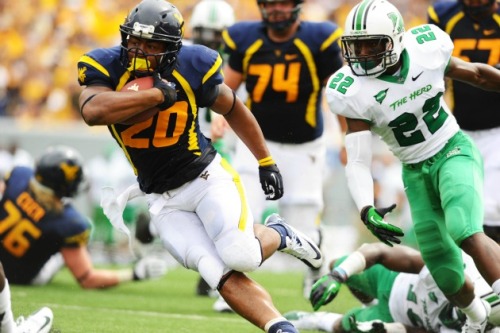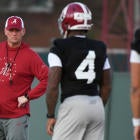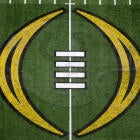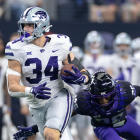
Already faced with a potentially massive lawsuit addressing the use of player images and likenesses, the NCAA may have to respond to another lawsuit on a different front.
Lawyers for a former West Virginia running back have proposed a class-action suit against the NCAA and the five power conferences, alleging that the Association violated antitrust laws by placing a cap on the value of athletic scholarships, which was below the actual cost of attending schools, Alabama.com reported. Essentially, the suit claims that there are out-of-pocket expenses that aren’t covered by a full scholarship.
And a study, cited in the Al.com report, backs that claim up.
“A 2012 study found that out-of-pocket expenses for a full scholarship FBS athlete in 2011-12 ranged from $1,000 a year to $6,904 a year, depending on the school.”
The suit was filed by former Mountaineer RB Shawne Alston (2009-2012) and seeks to represent former FBS scholarship football players who played at those five conferences since February of 2010. The SEC, Big Ten, ACC, Big 12 and Pac-12 were all cited as defendants, along with the NCAA.
The complaint asserts collusion from the power conferences because they have “stated they would implement the cost-of-attendance stipend if they were not bound by collusive agreements with smaller, cash-strapped schools.”
One of the most outspoken critics of the NCAA, ESPN's Jay Bilas, supports Alston's case.
@RealMikeSinger Not surprised. It's cartel, price fixing behavior. NCAA admits many would offer more, yet there's an across the board cap.
— Jay Bilas (@JayBilas) March 6, 2014
@RealMikeSinger All should be allowed to provide what they wish. No reason to cap benefits to players, and only players. It's wrong.
— Jay Bilas (@JayBilas) March 6, 2014
Bilas believes that schools should be allowed to offer players whatever the free market dictates.
@RealMikeSinger I'm for allowing players the same rights to fair value as everyone else in this multi-billion dollar business, yes.
— Jay Bilas (@JayBilas) March 6, 2014
Currently, the NCAA hasn’t agreed to allow schools to provide an extra $2,000 dollar stipend to help cover the gap, but at the NCAA convention in January, there was talk of providing extra benefits for athletes from the power conferences. This could, of course, potentially provide a recruiting boost for schools hailing from the power conferences.
The suit seeks to reverse NCAA rules that prohibit an extra stipend for athletes while also recovering damages for the expenses athletes were forced to pay when their scholarships didn’t cover everything under the cost of living.
“Under antitrust laws, a defendant’s desire to save costs – and thereby increase profits at the expense of other participants in the market – is not a legitimate justification for the grant-in-aid cap or any other horizontal agreement to restrict price or output,” the suit asserted.
The suit alleges that Alston had to take out a $5,500 loan to cover the difference while he was at West Virginia.
Aside from this suit, the firm of Hagens Bermans Sobol Shapiro is involved with the NCAA in settlement talks over the concussion issue as well as representing former college QB Sam Keller as part of the O’Bannon lawsuit.





















